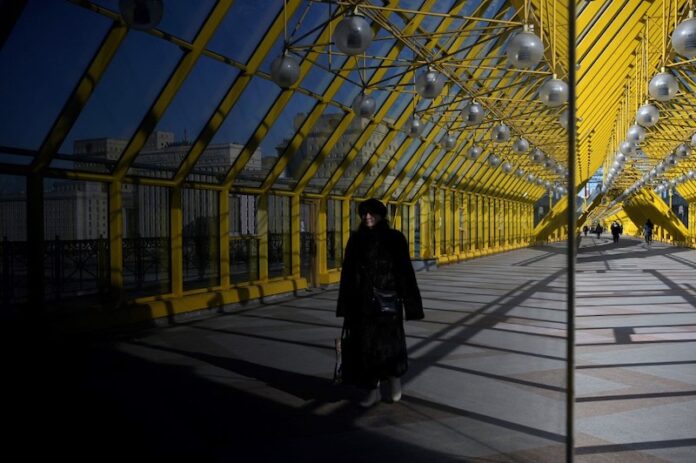A woman walks along a pedestrian bridge across the Moskva river with the Russian Defence Ministry headquarters seen in the background in Moscow on March 1, 2022. — AFP pic
MOSCOW, March 1 — Queues of people snaked through Moscow shopping malls today as the scramble for hard currency continued, and Russians faced increasing isolation as sanctions made travel harder and sports teams were ejected from major competitions.
Western sanctions over Russia’s invasion of Ukraine threaten to decimate the economy, and have already sent the rouble plunging to record lows this week before a partial recovery.
Wearing a light blue winter coat, Olga has spent the last two days searching for an ATM where she might be able to withdraw some of her savings in foreign currency.
Some Moscow residents waited for hours, only to find that automatic tellers were empty or carried just roubles.
One of the queues, reminiscent of Soviet times when people waited in line for hours to purchase staple foods, extended around the corner from the Tsvetnoy shopping mall.
“I haven’t managed to withdraw any euros yet,” Olga said as she waited in line to use the ATM. “I’m concerned. I somehow need to get cash.”
The Russian currency hit a low of 109.1850 against the dollar on the Moscow Exchange on Monday, days after Russia launched what it has called a “special operation” in Ukraine.
Some analysts said the rouble could continue its tailspin in the wake of more Western sanctions designed to ostracise Russia, raising the risk of a default on its foreign debt.
The central bank and the finance ministry did not reply to a Reuters request for comment on the possibility of defaults.
Since President Vladimir Putin launched Moscow’s military campaign on Thursday, Russians like Olga have begun bracing themselves for worsening living standards.
Already hit by high inflation, they fear prices will rise further and have already seen interest rates more than double as the central bank tries to shore up the local currency.
‘I don’t like it’
Russia has closed its airspace to airlines from the European Union and a string of other countries in response to sanctions, driving up ticket prices and severely limiting the population’s ability to travel.
Russians will also not be able to watch their national soccer team try to qualify for this year’s World Cup or world-renowned figure skaters, many of whom stepped on the podium at the Beijing Games last month, compete at international events.
With purchasing power steadily dwindling and few opportunities to leave, many Russians have opted to spend their roubles on electronic devices such as smartphones and laptops before they become scarce, or simply unaffordable.
Check Index, which analyses consumer trends in Russia based on transaction receipts, said that spending on electronics and appliances – often foreign-made – had jumped 80 per cent from Feb. 21-27 in comparison with the previous week.
Electronics retailer M.Video-Eldorado confirmed it had seen heightened demand for its products, which it attributed in part to the rouble’s volatility.
Clients at three of Russia’s 10 largest banks – VTB, private lender Sovcombank and central-bank-owned Otkritie – can no longer pay with ApplePay and GooglePay services.
That has created problems for metro users in Moscow, forcing commuters to buy one of the transport system’s Troika cards, use a plastic card or sign up to the city’s facial recognition Face Pay system instead.
“Everything is obviously bad,” said Anna, another Muscovite. “Everyone is going to be sad. Prices are going up. I don’t like it.” — Reuters


